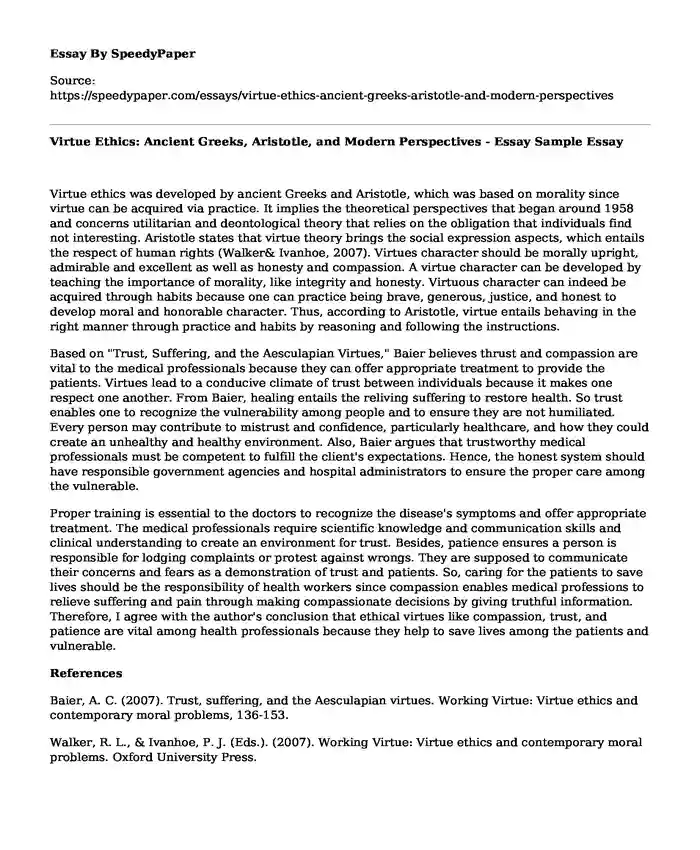
| Type of paper: | Essay |
| Categories: | Policy Philosophy Ethics Moral development Ancient Greece Ancient history |
| Pages: | 2 |
| Wordcount: | 438 words |
Virtue ethics was developed by ancient Greeks and Aristotle, which was based on morality since virtue can be acquired via practice. It implies the theoretical perspectives that began around 1958 and concerns utilitarian and deontological theory that relies on the obligation that individuals find not interesting. Aristotle states that virtue theory brings the social expression aspects, which entails the respect of human rights (Walker& Ivanhoe, 2007). Virtues character should be morally upright, admirable and excellent as well as honesty and compassion. A virtue character can be developed by teaching the importance of morality, like integrity and honesty. Virtuous character can indeed be acquired through habits because one can practice being brave, generous, justice, and honest to develop moral and honorable character. Thus, according to Aristotle, virtue entails behaving in the right manner through practice and habits by reasoning and following the instructions.
Based on "Trust, Suffering, and the Aesculapian Virtues," Baier believes thrust and compassion are vital to the medical professionals because they can offer appropriate treatment to provide the patients. Virtues lead to a conducive climate of trust between individuals because it makes one respect one another. From Baier, healing entails the reliving suffering to restore health. So trust enables one to recognize the vulnerability among people and to ensure they are not humiliated. Every person may contribute to mistrust and confidence, particularly healthcare, and how they could create an unhealthy and healthy environment. Also, Baier argues that trustworthy medical professionals must be competent to fulfill the client's expectations. Hence, the honest system should have responsible government agencies and hospital administrators to ensure the proper care among the vulnerable.
Proper training is essential to the doctors to recognize the disease's symptoms and offer appropriate treatment. The medical professionals require scientific knowledge and communication skills and clinical understanding to create an environment for trust. Besides, patience ensures a person is responsible for lodging complaints or protest against wrongs. They are supposed to communicate their concerns and fears as a demonstration of trust and patients. So, caring for the patients to save lives should be the responsibility of health workers since compassion enables medical professions to relieve suffering and pain through making compassionate decisions by giving truthful information. Therefore, I agree with the author's conclusion that ethical virtues like compassion, trust, and patience are vital among health professionals because they help to save lives among the patients and vulnerable.
References
Baier, A. C. (2007). Trust, suffering, and the Aesculapian virtues. Working Virtue: Virtue ethics and contemporary moral problems, 136-153.
Walker, R. L., & Ivanhoe, P. J. (Eds.). (2007). Working Virtue: Virtue ethics and contemporary moral problems. Oxford University Press.
Cite this page
Virtue Ethics: Ancient Greeks, Aristotle, and Modern Perspectives - Essay Sample. (2023, Oct 29). Retrieved from https://speedypaper.com/essays/virtue-ethics-ancient-greeks-aristotle-and-modern-perspectives
Request Removal
If you are the original author of this essay and no longer wish to have it published on the SpeedyPaper website, please click below to request its removal:
- Implemented Plans of the Ghanaian Government for Sustainable Development
- Essay Sample on Adoption of Children
- Paper Example: Dyslexia
- Free Essay on the Primary Causes of the American Revolution
- Paper Example on European History Image
- Paper Example: Genetic & Neurobiological Makeup May Lead to Learning Disabilities in Toddlers
- Measuring Motivation and Morale - Essay Sample
Popular categories




